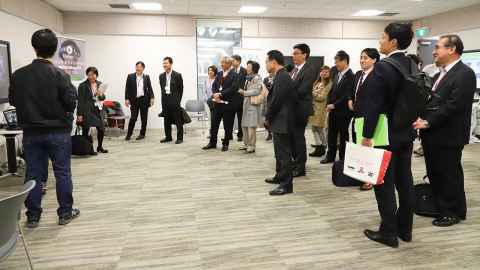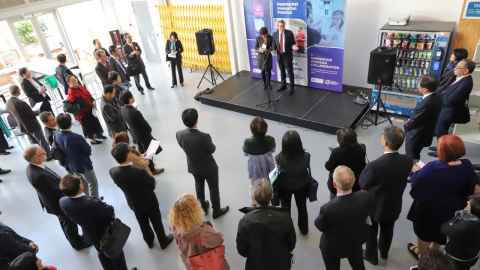Japan New Zealand Business Council members hosted by Newmarket Innovation Precinct
27 November 2018
Members of the Japan New Zealand Business Council (JNZBC) recently toured the Faculty of Engineering’s Newmarket Campus

The event was a collaboration between JNZBC, Viclink (Victoria University of Wellington), UniServices and the Newmarket Innovation Precinct (NIP), giving visitors guided tours of key research areas such as robotics, fluid dynamics, power systems and structural engineering.
NIP Manager Dr Enrico Tronchin took a leading role in putting the event together and was motivated by the chance to demonstrate a selection of technology and innovation capability that illustrates New Zealand’s status as a high-tech nation and valuable economic partner.
“The mere fact that NIP is being asked regularly to open its doors to curious and influential people from NZ and abroad is testament to the fact that there is some world-leading expertise and capability in the Faculty of Engineering and Newmarket Innovation Precinct,” Enrico said.
Dr Pau Medrano-Gracia, Business Development Manager noted that over the past three years there’s been an increase in commercial partnerships between Japan and New Zealand. He listed three particular areas of interest as energy, robotics and artificial intelligence, and virtual and augmented reality, all of which were on display in some form for the attending members.
The day began with Deputy Vice Chancellor (Research) Professor Jim Metson welcoming the group to the site and discussing the role it plays within the various campuses. Professor Metson described Newmarket as an outreach campus that has been moulded around the concept of innovation and high-level testing.

The group was then split between guided tours of a few significant research facilities as well as an exhibition space that had been setup to demonstrate a range of innovative start-ups and research groups, namely; M theory, AccuMM, DreamFlux, Kara, Dotterel, AI-See, Empathetic Computing Lab and Engineering VR/AR Lab. These hands-on demonstrations displayed applications of technologies such as augmented and virtual reality, revealing how they could be used in real-world contexts.
Ms Soriya Em introduced the tour groups to a selection of the projects being undertaken by the Centre for Automation and Robotic Engineering Science (CARES), mainly focusing on the fields of healthcare and horticulture. The members were given a live demonstration of social robotics research with a robot that could respond to voice commands and display facial expressions. CARES is led by Prof Bruce MacDonald.
A stop at the Water Engineering laboratory reinforced Professor Metson’s points about one of the Newmarket Campus’ strengths being its size. The facility accommodates multiple large flumes, and guests were able to get a close-up view of the equipment and some of the smaller scale dam modelling research projects.
The weather prevented some of the earlier tour groups from making their way to the Structures Testing Laboratory, so were instead introduced to the research focuses of the Power Systems and Power Electronics groups. Technical Manager Rob Champion discussed the links between the group’s current research in inductive power research and the work started by Professor Emeritus John Boys thirty years ago.
Reflecting on the day, Enrico thanked Dr Pau Medrano-Gracia and Josie Rainer from UniServices, as well as Claire Bennett and the Precinct Ambassadors from NIP for the remarkable team effort that ensured the event ran as well as it did. Drs Tronchin and Medrano-Gracia were also thankful to Mr Ian Kennedy, Chairman of the JNZBC, for the opportunity and the assistance of the Council.
“I’d also like to thank the technical and research staff of Faculty of Engineering and Auckland Bioengineering Institute, who we call upon regularly to exhibit university IP or showcase lab facilities,” he added.
“Without their good work and ongoing willingness to engage with industry we would have a much less positive impact on industry’s perception of our excellent R&D and IP commercialisation successes.”
Events such as this help grow NIP’s profile as an integrated R&D community and innovation hotspot. As this reputation grows both nationally and internationally, Enrico and the rest of the NIP team want to capitalise on the precinct’s brand equity to ensure research and development collaborations continue to grow in terms of number, value and economic impact.